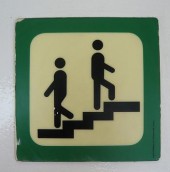Feeling Disconnected
I am certain many people can relate to this topic when connected to mental illness. In my life, feeling disconnected from people occurred at times that defined large changes in my life--when coming to terms with diagnosis, working to recover, and finally to reach a level of acceptance.
Before Diagnosis
 Imagine how you felt-- visualize it--when you were first told you had a mental illness and it would not go away. You would get better, with time and work, but it would always be part of you. In my experience, I felt both relief and fear.
Imagine how you felt-- visualize it--when you were first told you had a mental illness and it would not go away. You would get better, with time and work, but it would always be part of you. In my experience, I felt both relief and fear.
Relief because my illness, bipolar disorder, explained some of my actions. The idea that I could recover--though this seemed impossible at the time--made me feel a little safer. But I was still afraid. Unsure of the new ground I was walking on. Wondering if I would fall.
And then--and I am sure many of you can relate--I felt like the black sheep. My parents were still my parents and my friends remained by my side--most of them. But I felt disconnected. Different. Unsure of myself and my new diagnosis. It was a time of growth and also of isolation.
This experience, this feeling, is transferable: If you injure yourself and are stuck in bed for a few weeks, or sick with a flu, you feel disconnected from life. But with the diagnosis of a mental illness it's more difficult---you wonder if those who support will stick by your side.
While Working to Recover
Once diagnosed, your world is turned upside down. You might have become sort of used to the madness-- as terrifying as it was. Recovering is like learning to skate when you have never set your foot on ice. You wonder if it's possible.
When I was working to recover from mental illness and addiction I felt that nobody understood how I felt. This belief is self-defeating. We all experience pain and sometimes we all need support.
Regardless of this, when working to figure out how to live your life in a way that will support recovery, you might feel disconnected from people. They probably do not take different pills a couple of times a day. A few times. They probably do not have to work to figure out what the hell happened to their life and how the hell they can find a new one.
Accepting the Diagnosis of Mental Illness
Once you have arrived here you are probably doing a heck of a lot better than when first diagnosed. But it's still hard to feel connected to people. Mental illness can be a terribly lonely disease and loneliness, if left untreated, can be as painful as life before diagnosis.
Let People Into Your Life
 Those who love you, more often than not, are willing, are wanting, to hold your hand through the tough bits. Remind yourself that when they falter, as we all do at different times in our lives, you will be able to return the favor. It helps to reassure yourself that you are not unique in your pain, you are not exclusively disconnected, you are human. As we all are.
Those who love you, more often than not, are willing, are wanting, to hold your hand through the tough bits. Remind yourself that when they falter, as we all do at different times in our lives, you will be able to return the favor. It helps to reassure yourself that you are not unique in your pain, you are not exclusively disconnected, you are human. As we all are.
We all try to find out way in life, our place, and we all struggle. Try to embrace it and work through it. After all, you have nothing to lose.
APA Reference
Jeanne, N.
(2012, January 2). Feeling Disconnected, HealthyPlace. Retrieved
on 2025, April 24 from https://www.healthyplace.com/blogs/recoveringfrommentalillness/2012/01/feeling-disconnected